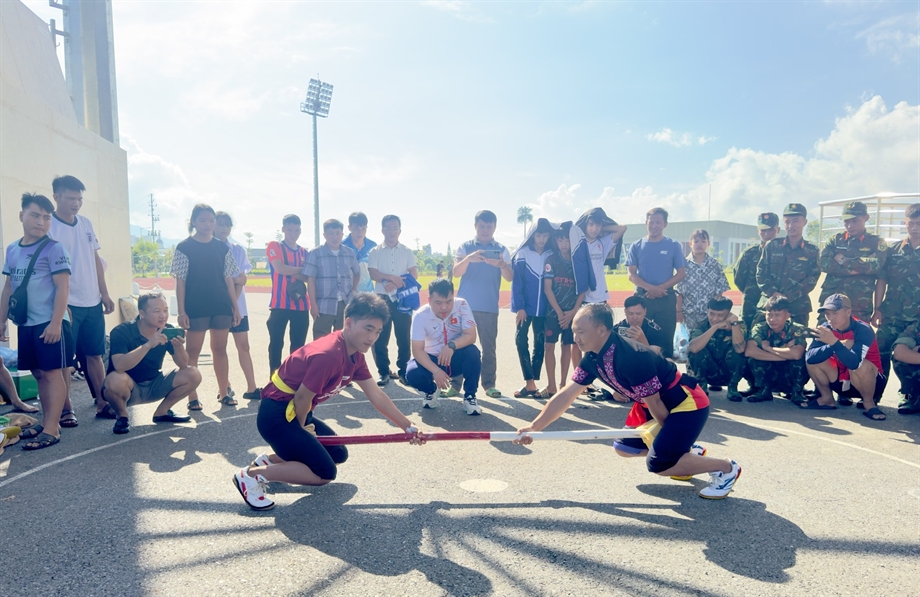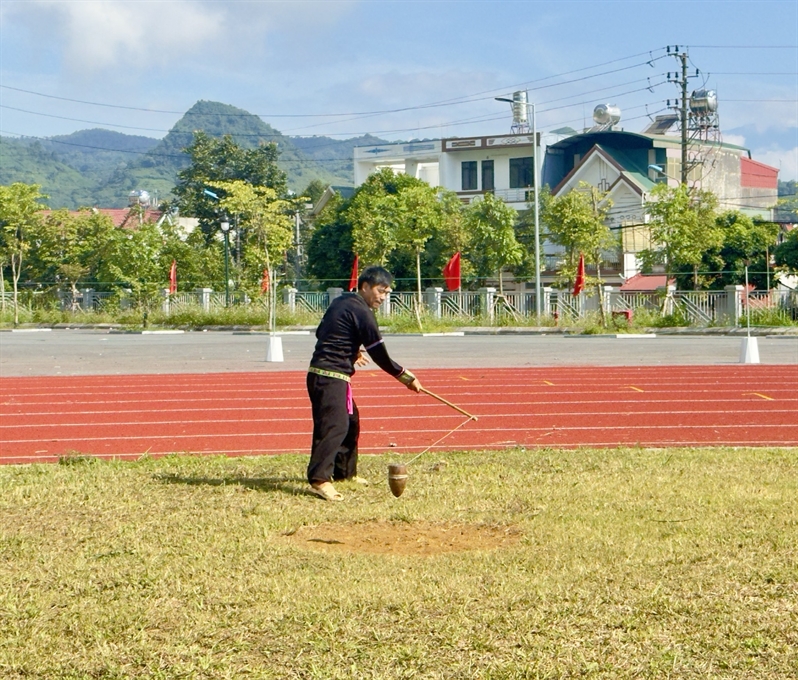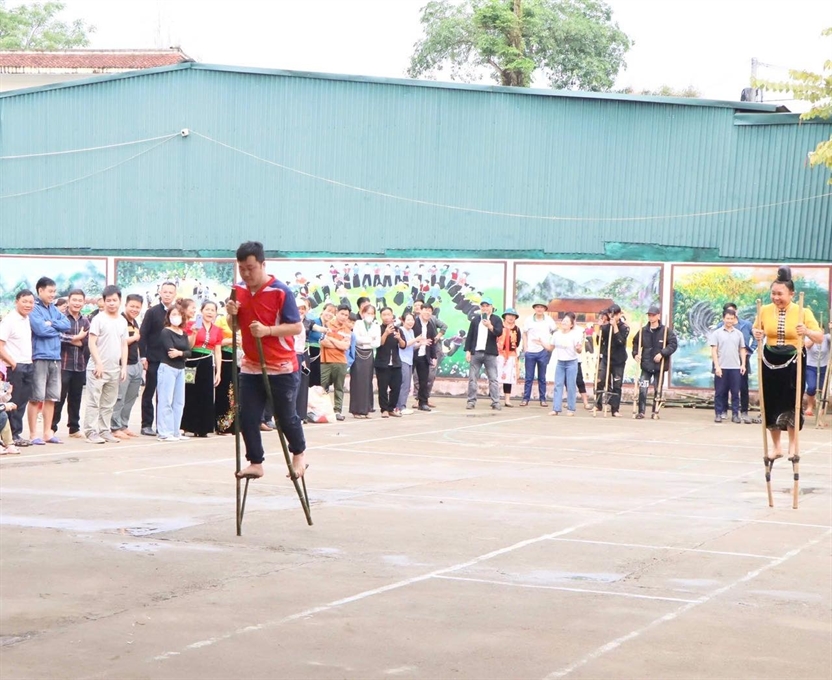Traditional sports – a bridge between culture and sustainable development
In the context of globalization and the strong development of modern sports, many traditional sports and games in the ASEAN region and China are facing the risk of being lost. Restoring and preserving these values is therefore considered one of the important tasks, not only to preserve intangible cultural heritage, but also to foster solidarity, enhance people-to-people exchanges and create motivation for the development of cultural and sports tourism.

Traditional sports and games such as tug of war, stick pushing, crossbow shooting, traditional wrestling or volleyball... are closely associated with community life. They are not only recreational activities, improving health but also bear a strong cultural imprint, reflecting the customs, habits and history of each country and each region.
However, in the face of globalization and the explosion of modern sports, many values of traditional sports and games are gradually fading away, even disappearing in daily life. A segment of young people have little opportunity to come into contact with these traditional sports, making the risk of a break in the legacy increasingly evident.
ASEAN–China cooperation: A Strategic Response
To address these challenges, ASEAN and China have jointly launched the ASEAN–China Project on the Restoration of Traditional Sports and Games. The project pursues several key objectives: Conducting research, documentation, and systematization of distinctive traditional sports and games; Organizing annual folk sports festivals to revive community traditions; Integrating traditional games into schools as part of physical education, enabling students to experience cultural heritage firsthand; Promoting exchanges and demonstration events within ASEAN–China cooperation frameworks, turning traditional sports into cultural bridges.

This initiative is also closely aligned with the trend of heritage preservation for sustainable development. Member states are encouraged to incorporate folk sports into cultural–tourism cooperation programs, thereby attracting international visitors and contributing to local economic growth.
Beyond cultural significance, traditional sports also create opportunities for tourism. In many countries, festivals featuring folk games have become unique tourism products, drawing tens of thousands of participants. If properly organized and promoted, ASEAN–China traditional sports could become a “soft brand,” enhancing the region’s cultural profile on the global stage.
This approach also allows countries to leverage their unique local cultural assets, transforming traditional sports into distinctive experiences while generating livelihoods for local communities.
In the era of international integration, restoring and preserving ASEAN–China traditional sports and games is not only about safeguarding the past but also about shaping cultural identity for the future. It provides young generations with a deeper understanding of their roots, fosters appreciation of cultural values, and strengthens awareness of the importance of heritage preservation.
ASEAN–China cooperation is therefore regarded as a strategic move—preserving heritage while creating new momentum for sports and cultural development. From tug of war and shuttlecock kicking to lesser-known traditional games, all now have the opportunity to be revived, serving as bridges between past and present, culture and tourism, and nations within a diverse and united community.
Vietnam contributes to spreading identity in ASEAN-China cooperation on traditional sports
In the process of cooperation to restore and preserve traditional sports and games of ASEAN-China, Vietnam is considered one of the leading countries with many outstanding results, contributing to affirming the role, cultural identity and common responsibility of the region.

Vietnam is a country that possesses a rich treasure of traditional sports and games, such as tug of war, stick pushing, shuttlecock kicking, human chess, traditional wrestling, crossbow shooting... Many sports not only exist in community life but are also elevated to national-scale cultural and sports events, such as the Traditional Wrestling Festival in Bac Ninh, Phu Tho Tug of War Festival or the International Shuttlecock Kicking Tournament held annually.
In particular, Vietnam, along with South Korea, Cambodia and the Philippines, jointly submitted a dossier to UNESCO to recognize tug of war as a representative intangible cultural heritage of humanity in 2015. This is a clear demonstration of Vietnam's proactive role and international responsibility in preserving common values.
Ethnic wrestling, chess, shuttlecock kicking and many other folk games have been recognized by the Ministry of Culture, Sports and Tourism as national intangible cultural heritages. Traditional festivals such as the Giong Festival (Hanoi), Hung Temple Festival (Phu Tho), and Sinh Village Wrestling Festival (Hue) regularly organize folk games, creating conditions for people to directly participate. Folk game festivals in schools are held in many localities, helping the younger generation access and maintain their attachment to traditional culture.
Within the framework of cooperation with China, Vietnam has actively participated in many programs: Collecting, researching and digitizing documents on traditional games, creating a scientific basis for preservation; Bringing national sports and folk games into schools and mass sports movements, arousing the interest of young people; Participating in international festivals and exchanges, where traditional Vietnamese sports such as tug of war, shuttlecock kicking, and human chess have been highly appreciated by international friends for their uniqueness and cultural value; Connecting sports with tourism, when many folk festivals are exploited as unique tourism products, attracting a large number of domestic and foreign tourists.
Through these efforts, Vietnam not only contributes to the successful implementation of the ASEAN-China joint initiative, but also affirms its pioneering role in preserving intangible cultural heritage. This is also an opportunity to promote the image of a country rich in identity, friendly people and unique culture to regional and international friends.
Vietnam's cooperation in this cooperation shows a clear direction: preservation is not only for preservation, but also for development, turning traditional sports and games into a cultural - tourism bridge, while fostering the strength of community cohesion in the integration period.
Nguyen Khang